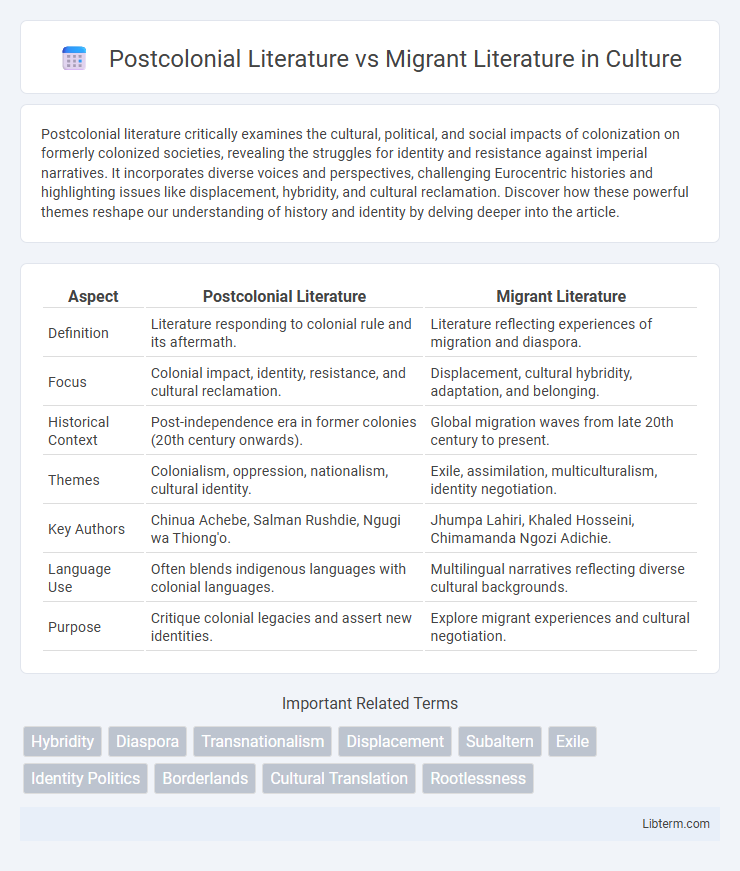Postcolonial literature critically examines the cultural, political, and social impacts of colonization on formerly colonized societies, revealing the struggles for identity and resistance against imperial narratives. It incorporates diverse voices and perspectives, challenging Eurocentric histories and highlighting issues like displacement, hybridity, and cultural reclamation. Discover how these powerful themes reshape our understanding of history and identity by delving deeper into the article.
Table of Comparison
| Aspect | Postcolonial Literature | Migrant Literature |
|---|---|---|
| Definition | Literature responding to colonial rule and its aftermath. | Literature reflecting experiences of migration and diaspora. |
| Focus | Colonial impact, identity, resistance, and cultural reclamation. | Displacement, cultural hybridity, adaptation, and belonging. |
| Historical Context | Post-independence era in former colonies (20th century onwards). | Global migration waves from late 20th century to present. |
| Themes | Colonialism, oppression, nationalism, cultural identity. | Exile, assimilation, multiculturalism, identity negotiation. |
| Key Authors | Chinua Achebe, Salman Rushdie, Ngugi wa Thiong'o. | Jhumpa Lahiri, Khaled Hosseini, Chimamanda Ngozi Adichie. |
| Language Use | Often blends indigenous languages with colonial languages. | Multilingual narratives reflecting diverse cultural backgrounds. |
| Purpose | Critique colonial legacies and assert new identities. | Explore migrant experiences and cultural negotiation. |
Introduction to Postcolonial and Migrant Literatures
Postcolonial literature examines the cultural, political, and social impacts of colonialism on formerly colonized societies, emphasizing themes of identity, resistance, and hybridity. Migrant literature explores the experiences of displacement, migration, and diaspora, highlighting issues of belonging, adaptation, and cultural negotiation. Both literatures critically engage with power dynamics and identity formation, but postcolonial literature centers on colonial histories, while migrant literature focuses on contemporary mobility and transnationalism.
Defining Postcolonial Literature
Postcolonial literature explores the cultural, political, and social impacts of colonization and its aftermath on formerly colonized societies, emphasizing themes of identity, resistance, and decolonization. It often critiques imperial power structures and highlights the hybridization of cultures resulting from colonial histories. This genre differs from migrant literature, which centers on the experiences and challenges of displacement, migration, and diasporic identity formation.
Understanding Migrant Literature
Migrant literature explores the complex experiences of displacement, identity negotiation, and cultural hybridity specific to individuals and communities who move across borders. It emphasizes themes of migration, exile, diaspora, and the intersections of home and belonging, often reflecting personal and collective struggles in adapting to new environments. Unlike postcolonial literature, which primarily critiques the aftermath of colonialism and empire, migrant literature centers on ongoing mobility and migration's impact on identity and social dynamics.
Historical Contexts and Origins
Postcolonial literature emerges from the historical contexts of former colonies grappling with the aftermath of empire, focusing on themes of identity, resistance, and cultural hybridity. Migrant literature originates from the experiences of displacement and adaptation of individuals or communities moving across national borders, often emphasizing diasporic identity and transnational connections. Both literatures intersect in their exploration of power dynamics and cultural negotiation but differ in their primary historical catalysts: colonial subjugation versus migration and resettlement.
Major Themes in Postcolonial Literature
Postcolonial literature explores themes of identity crisis, cultural hybridity, and resistance against colonial oppression, emphasizing the reclaiming of indigenous narratives and critique of Western dominance. It often addresses the trauma of colonization, highlighting issues like displacement, racism, and the legacy of imperialism in newly independent nations. These major themes contrast migrant literature, which primarily focuses on the experience of migration, assimilation, and the search for belonging across borders.
Core Motifs in Migrant Literature
Migrant literature frequently explores core motifs such as displacement, identity negotiation, and cultural hybridity, reflecting the migrant's experience of crossing and inhabiting multiple cultural boundaries. Themes of memory, loss, and the search for belonging are central, often portraying the tension between homeland nostalgia and adaptation to new sociocultural environments. These motifs distinguish migrant literature from postcolonial literature, which typically centers on colonial histories, power dynamics, and resistance against imperial structures.
Points of Convergence: Shared Experiences
Postcolonial literature and migrant literature converge through their exploration of identity crises stemming from dislocation and cultural hybridity. Both genres depict the struggles against systemic oppression and the reclaiming of marginalized voices in formerly colonized or migratory contexts. Themes of memory, belonging, and resistance to cultural erasure highlight their shared narratives of displacement and resilience.
Key Differences: Identity, Voice, and Belonging
Postcolonial literature explores the impact of colonialism on identity, emphasizing themes of cultural hybridity, displacement, and resistance against imperial narratives, while migrant literature centers on the experiences of movement, adaptation, and negotiation of belonging in new sociocultural contexts. Postcolonial voices often grapple with reclaiming suppressed histories and challenging colonial power dynamics, whereas migrant literature typically foregrounds personal and collective stories of migration, assimilation, and the search for home. In terms of belonging, postcolonial texts address fractured national identities shaped by colonial legacies, whereas migrant literature highlights fluid, transnational senses of identity shaped by continuous migration and settlement processes.
Influential Authors and Representative Works
Postcolonial literature features influential authors like Chinua Achebe, known for "Things Fall Apart," and Salman Rushdie, author of "Midnight's Children," who explore themes of colonial legacy and identity. Migrant literature includes writers such as Jhumpa Lahiri, acclaimed for "Interpreter of Maladies," and Chimamanda Ngozi Adichie, author of "Americanah," addressing displacement and cultural hybridity. Both genres offer critical insights into power dynamics, memory, and the experience of otherness through their representative works.
Contemporary Relevance and Future Directions
Postcolonial literature critically examines the lingering effects of colonialism on identity, culture, and power structures, reflecting ongoing struggles for decolonization and cultural reclamation in contemporary society. Migrant literature explores themes of displacement, hybridity, and transnational identities, highlighting the lived experiences of globalization and migration in the 21st century. Future directions for both fields emphasize interdisciplinary approaches, including digital humanities and eco-criticism, to address evolving narratives of memory, migration, and postcolonial futures in a globalized world.
Postcolonial Literature Infographic

 libterm.com
libterm.com